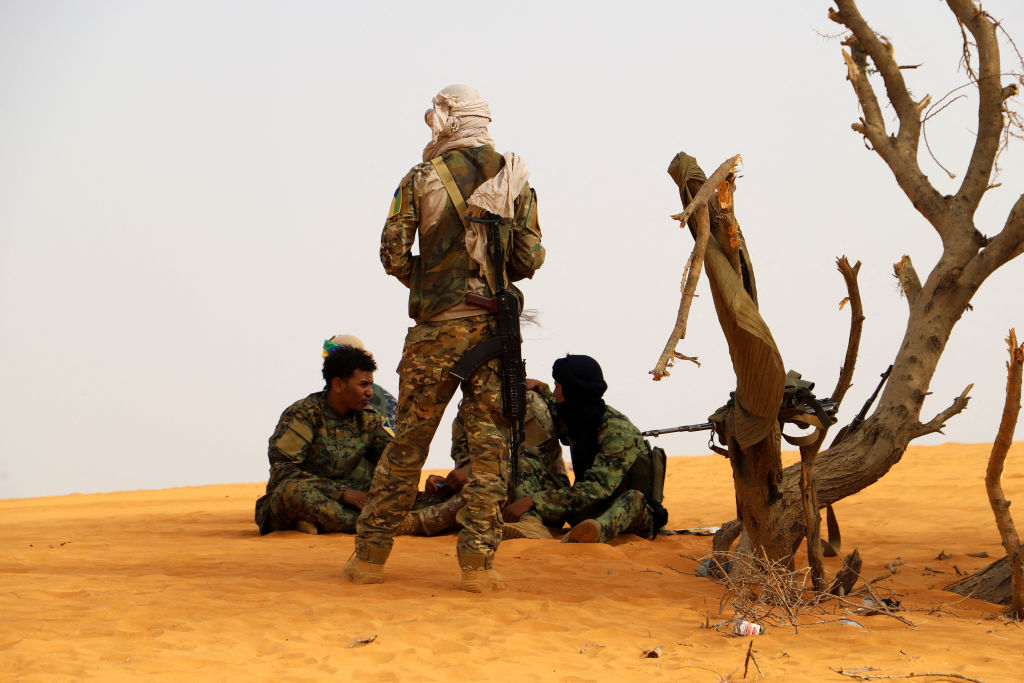ADF STAFF
Tensions between Algeria and Mali are growing over how to resolve Mali’s ongoing Tuareg rebellion, which has continued for more than a decade.
Algeria supports a negotiated settlement that addresses the rebels’ concerns and builds off a 2015 agreement. Mali’s ruling junta favors a military response.
“Algeria fears that these escalating tensions could lead to a successful Tuareg separatist movement, which would inspire marginalized ethnic groups across Algeria, Niger and Libya to pursue autonomy,” analyst Assala Khettache wrote recently for the Royal United Services Institute. “A Tuareg breakaway in Mali could potentially destabilize an already fragile Sahel region, with Algeria’s southern borders especially vulnerable.”
The Algeria-Mali relationship has degraded over the past year as Mali’s junta has accused Algeria of interfering in its internal affairs by meeting with rebels. In December 2023, both countries recalled their ambassadors. Algeria has led efforts to mediate peace between Malian leaders and the Tuareg groups. This mediation produced the 2015 Algiers Accords between the former Malian government and the Tuareg Coordination of Azawad Movements.
“Algeria strongly supported the 2015 peace agreement and attempted to salvage the deal in December 2023 due to fears that renewed hostilities in Mali would mobilize the Tuareg population in Algeria and cause refugees to flee into Algeria,” analyst Liam Karr wrote recently for the Institute for the Study of War.
Mali’s ruling junta has accused Algeria of harboring rebels. In January 2024, the junta ended Mali’s participation in the Algiers Accords as it ramped up attacks on rebels. In July, Mali’s military, backed by Russian mercenaries with Africa Corps (formerly the Wagner Group), were ambushed by Tuareg rebels while en route to attack the Malian side of Tinzaouaten, a community that straddles the border with Algeria.
The ambush by the Permanent Strategic Framework for Peace, Security and Development killed dozens of Malian soldiers and Russian mercenaries. Although the exact number of dead remains in dispute, observers consider the fight to be the deadliest encounter for Russia’s mercenary group since it arrived in Mali in 2021.
“The ambush brought Algeria’s security concerns to the forefront, exposing the fragility of its borders and deepening its diplomatic dilemma over how to counter Russian-backed forces in the Sahel without jeopardizing its crucial relationship with Moscow,” Khettache wrote.
Mali and its Russian allies followed up a month later with a drone attack on the community that killed 20 civilians and prompted a war of words between Algeria and Mali at the United Nations.
Tinzaouaten has been a base for both Tuareg rebels and Jama’at Nasr al-Islam wal-Muslimin, the Sahelien branch of al-Qaida, since the two groups expelled the Malian military in 2012.
The Tinzaouaten ambush and follow-up drone attack became another flashpoint in the relationship between the two nations even as they have both welcomed Russian influence — Algeria directly through long-standing ties with Moscow; Mali through its 2021 invitation to Africa Corps.
Despite their common ties with Russia, Algeria’s opposition to the Africa Corps means it is unlikely to help Mali put down its rebellion by force, Karr noted. That enables rebels to retreat across the porous border with Algeria to outlast and outmaneuver Malian forces, he added.
Algeria has called on the U.N. to demand an end to mercenary presence in Mali. However, Russia is unlikely to remove them because they have become a key tool for exerting influence in the Sahel, according to Karr.
“Mali is a vital piece in the Kremlin’s strategic ambitions in Africa,” he added. “Mali is also a crucial partner for Russia’s broader political project in the Sahel.”
Moscow’s continued support for Africa Corps in Mali could strain its ties with Algeria and force Algeria to rethink its preference for settling conflicts with diplomacy, according to observers.
“As tensions rise, Algeria faces the delicate task of balancing its critical partnership with Russia while considering whether military intervention in Mali is necessary to safeguard its interests,” Khettache wrote.

